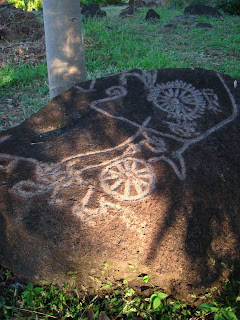Our bus was headed all the way to San Salvador, but we had requested to be let off in a town an hour over the border called Santa Ana. We had heard it was a 'rare gem', and allowed us to explore western El Salvador.
The stop was a gas station... somewhere. It was dark. Two other tourists (Liza and Hans) got off with us, and together we talked with the heavily armed doorman at the gas station. Immediately we noticed the Salvadorean accent is much more difficult to understand, but after talking for a while, we found out we were a couple of kilometers outside of Santa Ana.
The hotel in Santa Ana was a little rough around the edges, but the owner offered to drive us into town to his mother-in-law's restaurant. At night the town looked pretty closed up, and the restaurant was empty save for a couple of guys at the bar. Hans and I had chicken sandwiches, and he shared the tip of having a shot of tequila after a questionable meal to sanitize the insides. It seemed appropriate, as the two locals started playing American 80's rock on the jukebox. Getting into the spirit of the place, we put on "Paradise City", which drew the locals over, playing air guitar. Our conversation consisted of them naming bands from the 70's and 80's ("Yethro Toll"), and nodding in agreement about how much they rock.
Like happy drunks the world over, they were very difficult to get away from. As we went to leave, the waitress asked us if our taxi was outside. Taxi? The owner of the hotel told us it would be okay to walk home. We told her no, and the look on her face told the whole story. "Muy peligroso", very dangerous, she said. Everyone at the bar was going home by taxi. Apparently walking at night in Santa Ana is not done due to gang activity.
The next day we woke up to the 7am air raid siren, and explored Santa Ana. The town is nice during the day, with life happening and people around. But we knew we didn't want to spend another night there. There was a bus to one of the small towns in the country that afternoon, and Liza and we planned on taking it (Hans was nowhere to be found). As we waited for a taxi which never came, the gentleman fixing the tiles in the hotel lobby offered to walk us down to the bus station. Jorge Ramon. Again, someone went clear out of his way to help us out.
The bus terminal was a scene unto itself. The bus crawled through the bustling market, with a constant stream of vendors boarding the school bus and making their way out the back. It was like we were moving through this enormous living, writhing organism, with the line between bus and market blurring completely. My favorite stall I could see from the window sold flip flops and rat poison. Jina's was the vendor with hot sauce and toilet paper, a necessary pair. It took about half an hour to go the 100m of the market, and once out we rocketed up into the hills.

















